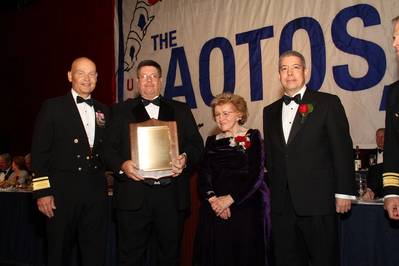Seafarer Heroism Honored at AOTOS Event
Five separate episodes of heroism and bravery on the high seas were recognized at the 42nd annual United Seamen's Service Admiral of the Ocean Sea (AOTOS) dinner.
The AOTOS event itself honored James L. Henry, Chairman and President of the Transportation Institute; General Duncan J. McNabb, USAF, former Commander, U.S. Transportation Command; and Robert D. Somerville, Chairman of ABS (formerly the American Bureau of Shipping). The maritime industry's most prestigious awards since 1969 were presented at a gala industry dinner and dance for more than 700 people at the Sheraton New York Hotel and Towers, New York City. A special AOTOS recognition plaque was given to Captain George Quick, former President of the Association of Maryland Pilots.
In addition, American ships and American seafarers performed acts of courage that were also honored. Two awards were presented to vessels and crews who participated in Operation Tomodachi, which followed the earthquake and tsunami that devastated Japan last March. These awards were presented by Rear Admiral Mark Buzby, USN Commander of Military Sealift Command. To the master and crew, USNS BRIDGE, Military Sealift Command, in support of Operation Tomodachi in Japanese waters, from March 13 - April 12, 2011. The plaque read:
The ground trembled March 11th across the eastern Japanese coast as a 9.0 earthquake rumbled, then triggered a wave of devastating tsunamis that left 12,000 dead or missing and damaged nuclear reactors at the country's Fukushima No. 1 Power Plant.
The combat support ship, operating as part of the USS Ronald Reagan Carrier Strike Group, was sailing toward Korea when the call came to divert to Japanese waters to assist the island nation in dealing with the devastation. The civilian-crewed USNS Bridge was the first MSC vessel on scene to provide humanitarian assistance and disaster relief in an American military operation quickly dubbed Operation Tomodachi. No one was certain how much danger the damaged nuclear reactors posed during the initial hours and days, the USNS Bridge pressed through dangerous, uncharted debris fields at sea while conducting search and rescue operations close to the coast to best provide vital lifesaving logistical support.
Sub-freezing temperatures and gale force winds did not deter the ship, which remained on station off the coast, providing vertical replenishment to Japanese Maritime Self Defense Forces day and night, often with little notice. Over a month's time, the USNS Bridge transferred more than 11,100 pounds of critical life-saving food and water, 4.4 million gallons of diesel marine fuel and another 650,000 gallons of JP-5 fuel, while conducting 23 underway replenishments at sea to keep U.S. Navy ships on station. Without concern for personal safety, these civilian mariners demonstrated dedication to duty under extreme and adverse conditions. Their unwavering support to Operation Tomodachi and to the thousands of earthquake victims in Japan is in keeping with the highest tradition of service by the Military Sealift Command and the U.S. Navy. Michael Ricci, T-AOE accepted the award.
The second plaque read: AOTOS Mariners' plaque, to the officers and crew of the USNS SAFEGUARD, Military Sealift Command, in support of Operation Tomodachi in Japanese waters, from March 25 - April 8, 2011.
A massive earthquake and subsequent tsunami struck eastern Japan March 11th, displacing more than 164,000 people, killing more than 12,000, and destroying ports and harbors. Only 24 hours after the quake, the USNS Safeguard, a rescue and salvage ship, was diverted from a mission in Korea and dispatched to Yokusuka in support of Operation Tomodachi, the U.S. military humanitarian aid / disaster relief effort.
While sailing into Japanese waters, the ship added Navy Mobile Diving Salvage Unit One and Navy Explosive Ordnance Disposal Mobile Unit 5 from the USS Tortuga, an amphibious transport dock ship, before sailing to port of Hachinohe, where 200 fishing vessels and 700 industrial shipping containers were missing, impeding the safe navigation of ships entering or leaving the harbor. The two vessels used side-scan sonar to survey more than 4.5 million square yards of harbor.
The Safeguard removed five tons of wreckage while diving units cleared a channel permitting a commercial liquid natural gas tanker to safely dock at Hachinohe to deliver vital heating fuel for the first time since the quake. Officers and crew under master Captain Ed Dickerson displayed exceptional seamanship under trying and difficult circumstances that included operations in a radiological environment, while battling strong winds, heavy seas and snow squalls. Chief Engineer Scotty Robinson accepted for the vessel and crew.
The Honorable Helen Delich Bentley presented two awards with David Matsuda, the U.S. Maritime Administrator. The first was an AOTOS Mariners' plaque to the master and crew of the Horizon PRODUCER of Horizon Lines, LLC for an incident that happened near the coast of Puerto Rico on January 29, 2011. A 17-foot fishing trawler was foundering, taking on water and on the verge of sinking when vigilant officers in the wheelhouse spotted two fishermen waving for help. Even as the ship's crew was undergoing shift change, Captain Mark Ruppert ordered engineers to slow to maneuvering speed while Chief Mate Cunningham, Second Mate McAfee and Third Mate Schick sounded alarms and mustered squads for a rescue.
A starboard pilot ladder was rigged and heaving lines and a line-throwing gun were made ready while the vessel maneuvered to within 200 feet of the boat, which was 120 miles from the nearest land, had no fuel and was sinking. The ship completed a round turn, maneuvered within 100 feet and Third Mate Schick fired the line-throwing gun. One of the fishermen was able to get the line, the small boat was pulled alongside the Producer and the fishermen were taken aboard.
The fishermen were then provided medical attention and given showers, clothes, food and water. The entire rescue from the distress signs to the safety of the fishermen took the skilled crew of the cargo vessel less than an hour. The professional actions of the Horizon Producer crew saved the lives of two fishermen, while demonstrating proficiency and devotion to duty in keeping with highest traditions of the sea. Captain Ruppert of the Horizon Producer accepted the plaque for his crew.
The next plaque was presented to the master and crew of the National Oceanic and Atmospheric Administration (NOAA) Ship THOMAS JEFFERSON for an incident that took place 17 miles north of Key West, Fla., on August 14, 2010 according to the plaque, the NOAA Ship was engaged in hydrographic mapping when alert watch-standers heard a U.S. Coast Guard radio call that a small Cessna 172 aircraft with one person aboard had crashed into the Gulf of Mexico some 30 miles from their location. The ship began steaming toward the crash site.
The needle-in-a-haystack challenge of locating a single-engine aircraft down in Gulf of Mexico waters in darkness wasn't considered daunting for the master and crew of the NOAA ship, who pressed their expert skills in use of hydrographic survey equipment and software to aid in calculating a probable search grid. A five-hour search ensued, with the crew poring over plotting tables to accurately predict the water drift and determine where the wreckage and pilot could be. Their expertise was so precise; the NOAA vessel anticipated the two-mile wreckage drift, enabling a rescue to be effected on the first leg of the search. The pilot was recovered safely and without incident. The NOAA vessel's unique skills, coupled with officers and crew demonstrating professional seafarer judgment while working in tandem to assist the U.S. Coast Guard, provided an experience unparalleled by NOAA and the Thomas Jefferson. The extraordinary efforts to rescue a life at sea are in the best tradition of maritime practices and the law of the sea. Commander Shepard M. Smith, NOAA was on hand to accept the award for his crew.
Finally, Mr. Matsuda presented four Mariners' Rosettes for individual acts of heroism that took place aboard a Maritime Administration ship AOTOS MARINER'S the M/V CAPE KENNEDY, operated by Keystone Shipping Company for a shipboard fire in New Orleans, LA on August 3, 2011. All four, First Assistant Engineer James Sutton, Second Assistant Engineer Robert Wappas, Third Assistant Engineer Marshall Sanford and Able Bodied Seaman Gary Toomer, were at the AOTOS event to accept their Rosettes.
The event was that contractors, while welding a doubler plate in the after part of the MARAD ROS Vessel CAPE KENNEDY, triggered sparks that landed in a pile of laundry, igniting and activating the fire detection system and the ship's fire alarm. This fire occurred on August 3, 2011 at the Poland Street Wharf in New Orleans, sending a skilled crew into instant damage control mode.
First Assistant Engineer James Sutton was the first person to arrive on scene at 1439 hours. He identified the fire location at the Main Fire Detection Panel, and then took over as the on-scene commander. He maintained his composure and dispatched Second Assistant Engineer Robert Wappas and AB Gary Toomer with full bunker gear and SCBA's to the linen locker. Their low air alarms sounded before the blaze could be brought under control with billowing clouds of black smoke sending the men back from the fire. With the nearest Emergency Gear Locker inaccessible, Third Assistant Engineer Marshall Sanford tore away the soaking wet fire suit from Toomer, donned it himself, and charged into the dense smoke of the Class Alpha fire.
Third Assistant Engineer Sanford was steady in dampening the fire until he heard the welcome words "New Orleans Fire Company Four, I'll take over", sending the by now exhausted Sanford to the side as 69 NOFD firemen from 23 separate units assumed command of the three-alarm fire. Smoke wafted through the ship for hours, as the crew took pride in knowing their constant fire drills as emphasized by Keystone and M.E.B.A. paid off in extinguishing the fire at 1604 hours without a single injury from the accidental fire.
USS has presented nearly 2,000 Honored Seafarer Awards in the past 42 years. All proceeds from the AOTOS event benefit USS community services abroad for the U.S. merchant marine, seafarers of all nations, and U.S. government and military overseas. USS, a non-profit agency established in 1942, operates centers in seven foreign ports in Europe, Asia, and Africa and in the Indian Ocean, and also provides seagoing libraries to American vessels through its affiliate, the American Merchant Marine Library Association.














